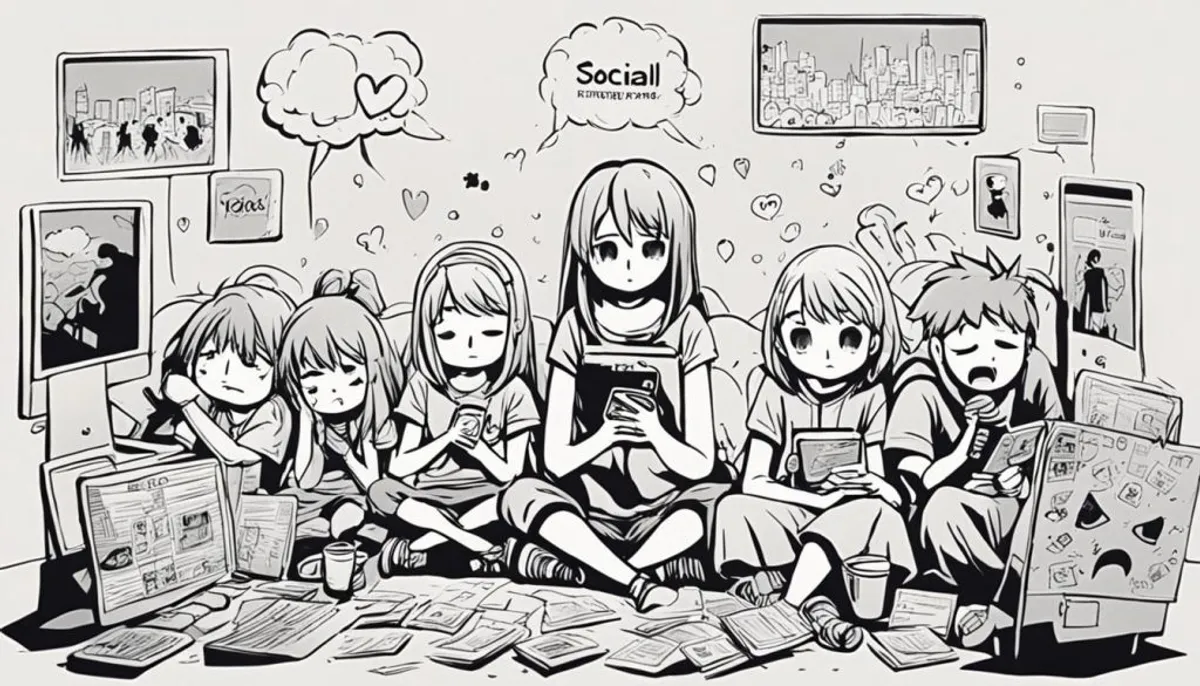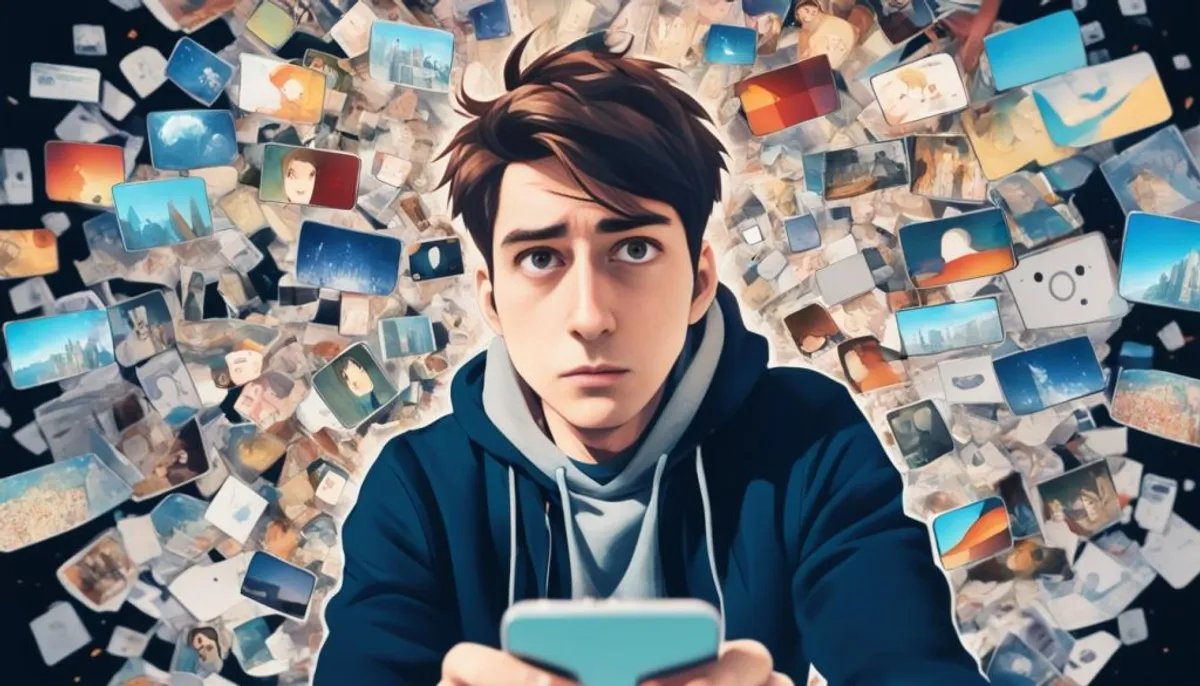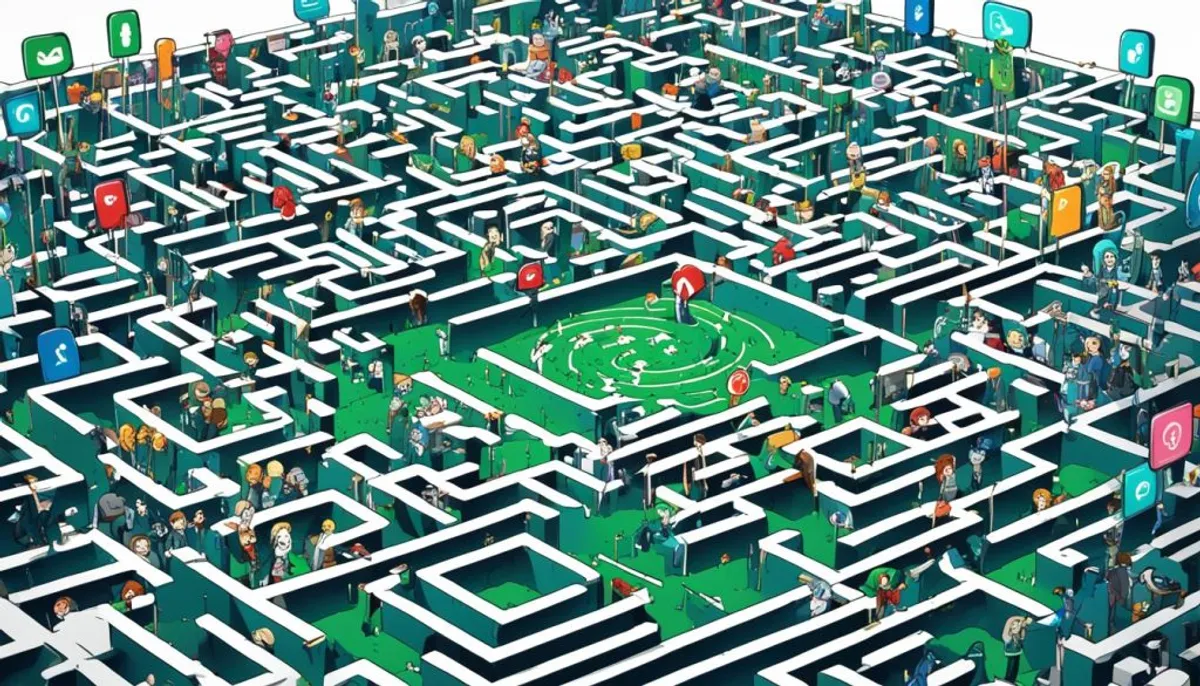Facebook, Twitter, Snapchat, YouTube, and Instagram are big parts of our lives. They bring many benefits, but they can also cause harm. Too much social media can hurt our mental health, relationships, how we see ourselves, and our overall happiness.

Key Takeaways:
- Social media can harm mental health, leading to stress, anxiety, depression, and feelings of loneliness.
- It can cause body image issues and push unrealistic beauty standards.
- It may harm relationships, with people preferring online friends over real-life connections.
- Seeing perfect lives online can make us feel not good enough and crave perfection.
- Many people are becoming addicted to social media, ignoring other important parts of life.
Impact on Mental Health
Social media is everywhere in our lives, and it offers many perks. However, it’s key to realize how it might affect our mental health. Studies have shown a link between too much social media and mental health problems. These include depression, anxiety, and low self-esteem.
Too much time on social media can make people feel not good enough. This happens as they compare their real lives to others’ best moments online. The fear of missing out, or FOMO, makes this worse. It causes a constant need to stay connected.
Social media can also make people feel lonely and disconnected. Even though we’re always connected online, many feel alone and crave real friendship. The shallow nature of online chats can make people want deeper connections.
Another big issue on social media is cyberbullying, especially for teens. The ease of being mean online can lead to hurtful words and rumors spreading fast. This can cause lots of emotional pain. Victims may struggle with depression, anxiety, and feelings of worthlessness.
We must be careful with how much we use social media to stay well. Setting limits and finding activities that make us feel good are important. If social media gets too much, talking to friends, family, or a professional can help.
Raising awareness about social media’s impact on mental health is key. This way, people can make better choices for their health. By knowing and dealing with these issues, we can use social media in a healthier way.
Relationship Problems
Social media can seriously affect relationships, leading to issues. The excessive use of social media often means less real-world interaction, leaving people feeling isolated from their loved ones.
Comparing your relationship to the perfect ones on social media can make you feel jealous and inadequate. Remember, social media only shows the best parts of people’s lives. Comparing your real life to these can be unfair.
Jealousy from social media is common. Seeing your partner get attention online can make you feel insecure. Plus, seeing others’ happiness online may make your relationship seem less exciting.
“Social media can create an unrealistic view of relationships. Remember, life isn’t as perfect as it seems online. A strong foundation and open communication are key to dealing with social media challenges.” – Relationship expert, Jane Smith
To fix relationship problems caused by social media, balance is key. Making time for real conversations and activities can help. This creates intimacy that’s often missing on social media.
Knowing how social media can hurt relationships is important. By managing your social media and focusing on real-life interactions, you can have healthier relationships.
Expert Advice for Maintaining Healthy Relationships in the Age of Social Media
John Davis, a relationship expert, offers advice for a healthy love life in the digital era:
- Limit social media time: Don’t let it take over time meant for your partner.
- Communicate openly: Discuss how social media affects your feelings and your relationship.
- Focus on real life: Share activities that help you connect on a deeper level.
- Practice empathy: Understand that social media often only shows the best moments. Avoid comparing your relationship to others.
- Set boundaries: Agree on online behavior to keep both partners feeling secure.
Impact on Self-Image
Social media changes how we see ourselves and others. We often compare our lives to perfect images online, leading to a fear of missing out. This can make us feel like we are not good enough.
“Social media allows us to compare our behind-the-scenes with everyone else’s highlight reel.”
Many people constantly measure themselves against others on social media. This can harm our self-esteem and how we view our bodies. Social media keeps showing us what it thinks beauty is, making us want to look a certain way. Such comparisons can negatively impact our mental wellbeing.
Unrealistic Beauty Standards Portrayed on Social Media
| Platform | Beauty Standard |
|---|---|
| Hourglass figure, flawless skin, and perfect makeup | |
| TikTok | Toned and sculpted body, trendy fashion sense |
| YouTube | Expertly contoured makeup, perfect hair |
| Filtered and edited photos, youthful appearance |
It’s important to see the dangers of comparing yourself on social media. We should focus on loving and caring for ourselves more. Knowing that what we see online isn’t always true can help us feel better about ourselves.
In the end, social media has a big effect on how we view ourselves. It often shows us beauty standards that aren’t real and makes us fall into the trap of comparing ourselves. Being aware of this and valuing our true selves can shield our well-being from social media’s negative side.
Social Media Addiction
Social media addiction is a problem for people of different ages. Thanks to easy access to platforms like Facebook and Instagram, it’s easy to start relying on them too much. This can be as bad as other addictions.
The signs of being addicted to social media are spending too much time online, using it to feel better, feeling upset if you can’t check it, ignoring your work or friends, and not wanting to talk to people face-to-face.
Social media can be addicting because of things like notifications and likes. Getting a “like” can make you feel good quickly, so you want more. This can make the addiction worse.
To deal with social media addiction, notice the signs early. Getting help from experts or groups can show you how to use social media better, as well as understand its impact on mental health.
Effects of Social Media Addiction
The bad effects of too much social media include:
- Mental Health: It can make you feel anxious, sad, and not good enough. Seeing others’ perfect lives online can make you feel jealous and hurt your mental health.
- Productivity and Focus: Using social media a lot can make it hard to stay on task. It can get in the way of getting things done and focusing.
- Relationships: It can hurt your relationships. You might start to care more about friends online than in real life. This can make you feel lonely and unhappy.
- Physical Health: Too much sitting and looking at screens can harm your body. It can lead to being overweight, sleeping badly, and pain in your neck or back.
It’s key to balance your social media and real life. Setting limits and finding fun things to do off your phone are good ideas.
Dealing with Social Media Addiction
If you think you or a friend has a social media problem, here’s what you can do:
- Self-reflection: Think about how much you use social media. Be honest if it’s causing you stress or sadness.
- Set boundaries: Make rules for when you can use social media. Spend the rest of your time on other things and with people you care about.
- Seek support: Talk to experts or join groups that know about addiction. They can offer advice and help you control your social media use.
- Develop healthy habits: Try new hobbies, get active, and spend time with family and friends instead of being online all the time.

Comparison of Social Media Addiction Symptoms and Other Addictive Behaviors
| Behavior | Social Media Addiction | Substance Addiction | Gambling Addiction |
|---|---|---|---|
| Withdrawal symptoms | Restlessness, anxiety when unable to check social media | Physical and psychological symptoms when unable to use the substance | Restlessness, irritability when unable to gamble |
| Neglect of responsibilities | Failure to fulfill personal and professional obligations | Disregard for work, family, and personal commitments | Disregard for work, family, and personal commitments |
| Escalating use | Increasing amount of time spent on social media | Progressively higher amounts or more frequent use of the substance | Bigger bets or more frequent gambling |
| Tolerance | Need for more engagement and validation on social media | Increased amounts of the substance to achieve the same effect | Need to place larger bets for the same thrill |
It’s very important to handle social media addiction carefully. Knowing the signs, setting limits, getting help, and doing things offline can free you from addiction. This way, you can enjoy a happier life both online and off.
Cyberbullying on Social Media
Cyberbullying has turned into a major issue on social media. About 10% of teens reported being cyberbullied. They face offensive comments, rumors, and harassment online, making reporting cyberbullying a crucial step in addressing this problem.
Social media’s anonymity makes cyberbullying easier. Bullies use fake accounts, hiding their real identity. This leads to emotional harm in victims.
We must fight cyberbullying to ensure online safety. Promoting positive online interactions through kindness and responsible behavior can decrease cyberbullying. A culture of respect protects social media users.
Impact of Cyberbullying
Cyberbullying harms mental health and well-being. It can cause stress, anxiety, and loneliness. Victims may also suffer from low self-esteem and struggle with relationships. Understanding the impact of cyberbullying is crucial for addressing these issues effectively.
“Cyberbullying on social media has a profound impact on victims, causing significant emotional distress and creating a hostile online environment.” – Dr. Jessica Davis, Psychologist.
Action against cyberbullying is vital. Reporting abuse and blocking bullies are steps to fight it. We need a safer, inclusive online community.
Preventing Cyberbullying
Prevention is key in tackling cyberbullying. Education, digital literacy, and positive online interactions are important. Social media should also enforce policies against abuse.
Supportive communities encourage reporting cyberbullying. Bystander intervention can reduce it. This helps create a respectful online environment.
Statistics on Cyberbullying on Social Media
| Age Group | Percentage of Victims |
|---|---|
| 13-17 years | 10% |
| 18-24 years | 6% |
| 25-34 years | 4% |
| 35+ years | 2% |
The data shows cyberbullying’s reach across ages. This emphasizes the urgent need to address and prevent it.
Together, we can fight cyberbullying. Our goal is to make social media positive, connective, and empowering for everyone.
The Role of Social Media Companies
Social media companies play a crucial role in shaping user experiences. They connect millions worldwide, influencing interactions and content spread. They must also protect user welfare and tackle potential harms on their platforms.
One critical task is preventing cyberbullying. Online harassment leads to emotional distress and even tragic outcomes. Social media platforms can help by setting up solid reporting systems, enforcing strict moderation, and actively fighting cyberbullying.
They also need to tackle unrealistic beauty standards. Many users, particularly young ones, face images that show a perfect version of beauty. This can make users feel bad about their bodies. Social media should promote body positivity and diversity, fighting those unrealistic ideals.
Being transparent and accountable is key for these companies to earn user trust. They should explain how they handle user data and offer easy-to-use privacy settings. They must act quickly against hate speech, misinformation, and harmful content to keep users safe.
“Social media companies have a responsibility to protect their users and cultivate a positive online environment. Transparency, accountability, and effective policies are essential to ensure the well-being and safety of millions of users, including preventing cyberbullying.”
Social media companies have a big influence on the digital world. By focusing on user mental health and inclusivity, and talking openly with users, they can create a better digital culture.

The Importance of User Feedback
Social media companies should listen to what their users have to say. Getting feedback helps them understand user needs and make their platforms better. This way, they can keep improving and serving their users well.
| Benefits of User Feedback | Actions Taken |
|---|---|
| Identify and address platform weaknesses | Developing robust reporting and moderation systems |
| Understand user needs and expectations | Improving user privacy settings |
| Gain insights into potential harms and user concerns | Taking a proactive stance against cyberbullying |
| Enhance user satisfaction and engagement | Promoting responsible content sharing and consumption |
By getting users involved in decision-making, social media companies can build trust. It gives users a sense of ownership and ensures the platform meets their diverse needs.
Balancing Social Media Use
It’s key to find a healthy social media balance to take care of your mind. Setting good habits and clear boundaries helps. This way, we use the internet positively and stay connected.
Setting limits on screen time helps manage our social media. Decide how long you’ll spend on these apps. This stops too much scrolling. It means more time for work, friends, and self-care.
Taking breaks from social media is good for us. Try tech-free hours or weekends without digital devices. This time off helps you do more activities in the real world.
Prioritizing real-world interactions makes social media better. Real-life chats and time with loved ones are key. They build stronger bonds than online likes.
Being mindful of one’s emotions and reactions online is important. Notice how certain posts make you feel. This helps you choose who and what to follow for a happier online life.
Engaging with social media in a way that promotes positive mental health means being real and kind. Share stories and support friends online. This builds a community that lifts everyone up.
| Balancing Social Media Use Tips |
|---|
| Set limits on screen time |
| Take breaks from social media |
| Prioritize real-world interactions |
| Be mindful of emotions and reactions |
| Engage authentically for positive mental health |
Conclusion
Social media is a big part of our lives today. It offers many benefits but also has risks. We need to know about the dangers, like how it can hurt our mental health, relationships, and how we see ourselves, including the impact of cyberbullying.
It’s important to find a good balance with social media. Making rules for ourselves and paying attention to how we feel when we use it can help. Being mindful helps us avoid the bad effects social media can have.
To use social media well, we need to understand its risks. We should take steps to protect our mental health. By doing this, we can enjoy the good parts of social media and reduce the bad parts. Let’s work together to make the online world safer and more positive.
FAQ
Why is social media harmful?
Social media can hurt your mental health and relationships. It can make you feel stressed, anxious, and depressed. These platforms can also make you feel alone and push unrealistic beauty images.
What are the negative effects of social media?
Social media’s bad sides include harming your mental health, causing problems in relationships, and making people jealous. It can also lower your self-esteem and push you to compare yourself unrealistically with others.
What are the dangers of networking?
Social networking’s risks include cyberbullying, harming your mental wellbeing, and making relationship issues worse. It also promotes false beauty ideals. These risks can deeply affect people’s feelings.
How does social media impact mental health?
It increases the chances of feeling depressed, anxious, and not good enough. It can make you feel left out and lonely. Also, bullying on social media can deeply hurt.
What relationship problems can be caused by social media?
Spending too much time on social media can reduce real-life talks and make us prefer online chats. It can cause jealousy and make us compare our relationships with others’.
How does social media impact self-image?
It encourages comparing ourselves to others and following fake beauty ideals. Seeing perfect life snapshots makes us want to be perfect, causing us to feel bad about ourselves.
What is social media addiction?
It’s using social media too much, like other addictions. Signs include wasting a lot of time online, using it to escape problems, and not doing important tasks.
What is cyberbullying on social media?
It’s when people use social media to say mean things, spread nasty rumors, and bully others. The easy access and anonymity on these platforms facilitate this, hurting those targeted.
What is the role of social media companies?
They need to tackle the negative aspects of their platforms and work to keep users safe. Being open and responsible is key to ensuring a safe space for everyone.
How can social media use be balanced?
To keep a good balance, limit how long you stay online, take regular breaks, and value in-person interactions. Paying attention to how you feel when using social media helps maintain a healthy use.
RelatedRelated articles



